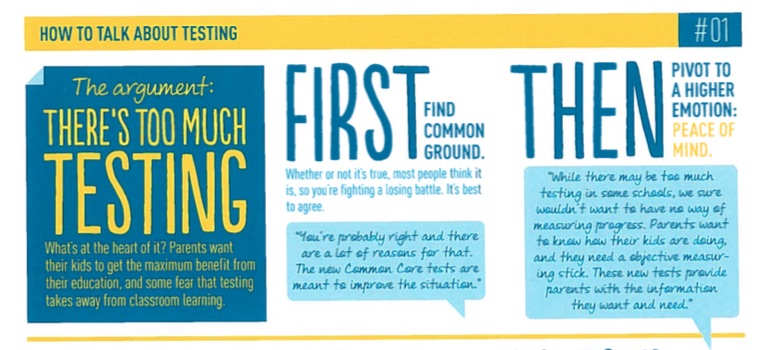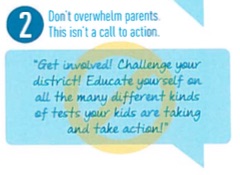Inside Training Document Reveals How Test-Supporters Want to Talk About Testing

By Anthony Cody.
I have received a training document from a recent conclave of corporate reformers that reveals in great detail how they would like to shape public discourse around the issue of testing.
In recent years the ways in which complex issues are framed has become a central task for those seeking to communicate with the public. George Lakoff’s book, Don’t Think of an Elephant, taught us how important it is to use language and conceptual frameworks to get our messages across. The creators of this document have taken his message to heart, and put a lot of thought into the framing of the issues surrounding testing and the Common Core.
With this in mind, it is informative to see how supporters of test-driven reform are seeking to shore up their eroding position in the public debate. The document I received is presented in bright colors with cartoon illustrations. I will share some of the main messages here, and you can download the whole thing here:HowToTalkAboutTesting. There is no author, source or sponsor listed.
The six page document is titled “How to talk about testing,” and each page tackles a different issue.
Page One: “The argument: There’s Too Much Testing. What’s at the heart of it? Parents want their children to get the maximum benefit from their education, and some fear that testing takes away from classroom learning.”
Advice:
FIRST: Find Common Ground:Whether or not it’s true, you’re fighting a losing battle. It’s best to agree.“You’re probably right, and there are a lot of reasons for that. The new Common Core tests are meant to improve the situation.”THEN: Pivot to higher emotion: Peace of MindWhile their may be too much testing in some schools, we sure wouldn’t want to have no way of measuring progress. Parents want to know how their kids are doing, and they need an objective measuring stick. These new tests provide parents with the information they want and need.DOs:Do position new tests as a solution, not the problem. Distinguish between adding more tests and replacing old tests.We know there are a lot of problems with tests. These tests were designed to address some of them. Many of the old tests being used today don’t provide parents and teachers with useful information. The new Common Core tests do. This isn’t about adding another test. It’s about replacing existing tests with something better.Do suggest the simple act of talking to the teacher. “Challenging the district” Get Involved” can overwhelm parents.DON’Ts:Are they perfect? No. But they’re better. Will the problem of overtesting go away overnight? No. But these tests will help.Don’t overwhelm parents. This isn’t a call to action.
[this section has a “do not” symbol on top of it] “Get involved! Challenge your district! Educate yourself on all the many different kinds of tests your kids are taking and take action!”
Here are some other quotes from subsequent pages:
Page #3: The Argument: It’s more than just teaching to the test. What’s at theInside Training Document Reveals How Test-Supporters Want to Talk About Testing - Living in Dialogue:





















